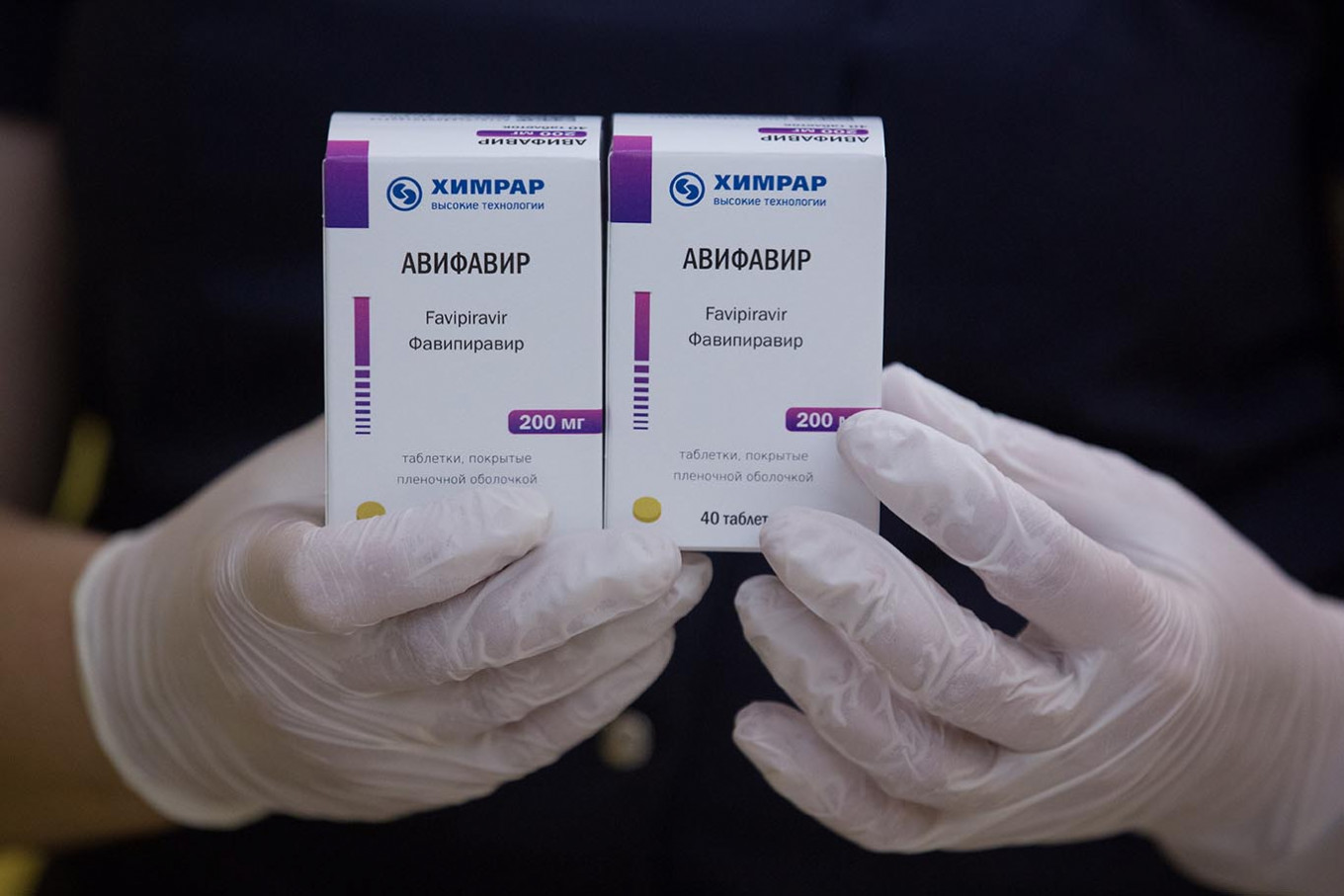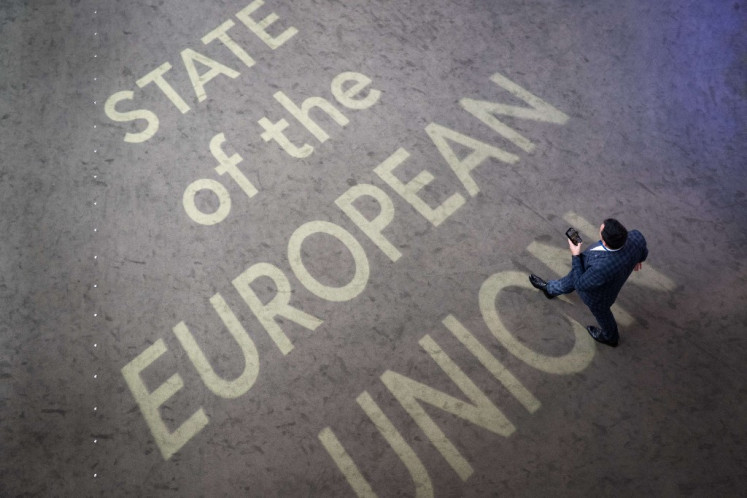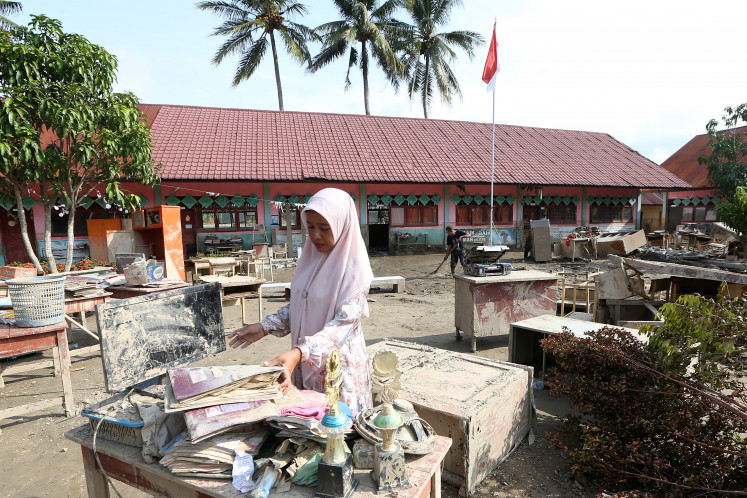Popular Reads
Top Results
Can't find what you're looking for?
View all search resultsPopular Reads
Top Results
Can't find what you're looking for?
View all search resultsPreventing misleading claim of COVID-19 cure
While people around the world are anxiously waiting for word on medical discoveries that could treat COVID-19, taking a cautionary approach to any news on a potential "cure" is advisable.
Change text size
Gift Premium Articles
to Anyone
 A worker presents packages containing Avifavir at a storage facility in Moscow, Russia, in this handout photo released on June 10, 2020. Avifavir is a new antiviral drug produced by biotech start-up ChemRar and approved by Russian authorities to treat COVID-19 patients. (REUTERS/Andrey Rudakov/Russian Direct Investment Fund (RDIF)/Handout )
A worker presents packages containing Avifavir at a storage facility in Moscow, Russia, in this handout photo released on June 10, 2020. Avifavir is a new antiviral drug produced by biotech start-up ChemRar and approved by Russian authorities to treat COVID-19 patients. (REUTERS/Andrey Rudakov/Russian Direct Investment Fund (RDIF)/Handout )
R
esearchers at Airlangga University (Unair) and the State Intelligence Agency (BIN) released on June 12 what appeared to be an encouraging statement: the discovery of five combination drug therapies and two stem cell therapies for treating COVID-19.
The acute respiratory disease caused by the SARS-CoV-2 virus has claimed at least 2,000 lives in Indonesia to date.
The joint statement attributed to Unair and BIN also said that the medicines were ready for distribution in treating COVID-19 patients.
Drug combinations
The five combination therapies for COVID-19 are: lopinavir/ritonavir with azithromycin, lopinavir/ritonavir with doxycycline, lopinavir/ritonavir with clarithromycin, hydroxychloroquine with azithromycin, and hydroxychloroquine with doxycycline.
In addition, the statement claimed that the researchers had identified two types of isolated stem cells that inhibited SARS-CoV-2 activity: hematopoietic stem cells (HSCs) and natural killer (NK) cells.
Their goodwill to bring an end to the pandemic should be appreciated. Unfortunately, their conclusions seem premature and could lead to more damaging consequences for the public.
In theory, the drug combinations recommended by Unair and BIN have the potential to inhibit SARS-CoV-2. Lopinavir and ritonavir are protease inhibitors that are currently used to treat people with HIV/AIDS. Hydroxychloroquine is a malarial treatment, while azithromycin, doxycycline and clarithromycin are antibiotics that can fight secondary bacterial (not viral) infections in COVID-19 patients who have developed pneumonia.
However, theory does not necessarily work in practice. None of these drugs have been proven in any clinical study to be a safe and effective treatment for COVID-19. The World Health Organization (WHO) has started clinical trials involving thousands of patients in dozens of countries to test the efficacy and safety of these drugs. So far, there has been no clear indication that these drugs, whether individually or in combination, are effective in treating COVID-19.
In fact, evidence exists that hydroxychloroquine may worsen the condition of patients, which led the WHO to suspend the clinical trial of the drug.
Unair and BIN are correct in conducting in vitro (test tube) experiments to verify the effect and toxicity of the drugs for SARS-CoV-2. Unfortunately, they have not communicated in any clear way on how they designed, executed and analyzed their experiments.
We do not know how they cultured the virus, what kind of negative controls they used, what kind of cells they tested or whether the cells they used contained the necessary receptors for SARS-CoV-2 to enter a human cell. More importantly, it is crucial to note that the results of in vitro experiments (however encouraging) cannot be assumed to be safe and effective treatments for direct use in human patients. For example, the United States Food and Drug Administration (FDA) on average approved less than 10 percent of drugs that performed well in vitro as safe for human prescription.
The human lungs contain millions of cells comprising dozens of different types that perform intricate interactions. The proposed drugs can also affect other organs in the human body and cause adverse reactions.
Instead of announcing that these five combination therapies are ready for treating COVID-19, Unair and BIN should first run a randomized controlled trial (RCT) to confirm their findings. Recruiting diverse patient populations is also critical to ensuring the fairness and robustness of the study.
Despite their good intentions, all the drugs that Unair and BIN researchers have proposed are “strong” medicines, whether individually or in combination, that can potentially cause unwanted side effects and even death. Surely none of us want to rush into an unproven treatment in order to avoid developing even more overwhelming health problems in the future.
Stem cell therapy
Stem cell therapy is another COVID-19 treatment that Unair and BIN researchers have proposed. Stem cells are undifferentiated cells that has the potential to develop into many different types of cells in human body. One type of stem cell they have proposed is hematopoietic stem cells (HSCs), which develop into blood cells, including immune cells that help the body fight pathogens and infections.
However, stem cell therapy is still considered very risky, expensive and limited to treating a few cancers, such as leukemia. No evidence exists that stem cell therapy is efficient in treating viral infections in the human body such as COVID-19.
As with the drug therapies, the Unair and BIN researchers did not say how they performed their stem cell experiment. We have no information on crucial aspects like stem cell culturing protocol, the stem cell's differentiation status, tumorigenic potential, proliferation capacity or excretion patterns, and how they tested stem cell activity against SARS-CoV-2.
Even if the researchers established a sound experimental protocol for their in vitro experiments, administering stem cell therapy to COVID-19 patients is an extremely dangerous procedure that can result in undesirable costs, such as malignancy, the stem cells attacking other healthy cells and possibly death.
Injecting stem cells into the human body carries a huge risk of immuno-rejection (think of a blood type A patient receiving a blood type B infusion, but with a much more severe reaction). The doctors administering the treatment must isolate autologous stem cells from the individual patient or allogenic stem cells from a separate donor, culture them, and reinject the treated cells into the patient. These processes are extremely laborious, time-consuming and expensive, and there is no clear indication that the treatment will produce a safe and successful outcome against viral infection.
This is hardly a sound strategy to use during a pandemic. Furthermore, the common procedure is to administer powerful immunosuppressants to reduce the strength of the patient’s immune system, particularly in the allogenic scenario, which would minimize the risk of immuno-rejection. However, it would be unwise to shut down a COVID-19 patient's immune system that is needed to work properly for their body to fight SARS-CoV-2.
Unair and BIN's valiant efforts should still be applauded, as they are committed to treating COVID-19 and ending the pandemic. The public is waiting impatiently for the health crisis to subside so they can resume their normal lives.
However, everyone should realize that discovering treatments and developing a potential vaccine for a disease that was virtually unknown six months ago takes a lot of time and resources.
Unair and BIN said that they had submitted their research to at least seven peer-reviewed international journals, but this does not mean that their research is validated immediately. It still needs reviewing and questioned by their scientific peers.
It is necessary for the researchers to publish their findings on an open access, preprint repository for biological or medical research papers like BiorXiv or MedrXiv, so that scientists and people around the world can scrutinize and engage in healthy scientific discourse.
We absolutely deserve good news during the pandemic on safe medical treatments and vaccines. We also deserve complete, clear and transparent public communications from all COVID-19 stakeholders, including researchers and governments, to ensure that all actions are evidence-based, safe and effective.
The writer is a research scientist with a PhD in biochemistry from the University of Cambridge, which he earned as a recipient of the 2015-2019 Gates Cambridge Scholarship program.









